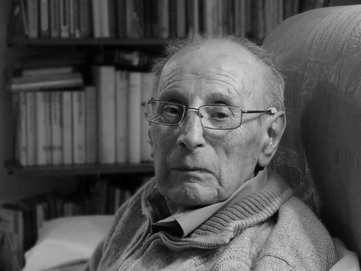David Daiches Raphael (1916-2015)

The philosopher D D Raphael, whose outstanding work on Adam Smith was widely acknowledged, died in December 2015, just one month short of his 100th birthday.
Professor Christopher Berry writes: All David Raphael's work exemplified analytical acuity and the clarity of his thinking was matched by the clarity of his prose and verbal expression. These were all attributes that made him an excellent teacher. A proud upholder of the Glasgow tradition where 'the' professor lectured to first year undergraduates, he would sit still and through the lucidity of his exposition conveyed complex argument in such a manner than his audience could follow him. In no way could this be construed as a 'dumbing-down'. Raphael maintained high intellectual standards whatever the audience or the setting, as an exemplar of clear thinking he was a ferocious and daunting critic of anyone (no matter their academic status) whom he judged to be vague or sloppy.
It was typical of his thought that all his books were sharp and to the point - not for him lengthy tomes; brevity was the soul of clarity, prolixity typically the symptom of fuzziness. His writings broadly fell into two categories. There were books that dealt with concepts and issues in moral and political thinking some of which, such as Problems of Political Philosophy were based on his Glasgow lecture course. Others dealt with historical thinkers and problems in eighteenth-century British, especially Scottish, thought (with a brief excursion on Thomas Hobbes). His first book The Moral Sense (based on his Oxford D.Phil) and his last The Impartial Spectator both dealt with key issues in eighteenth-century moral debate. The last of these was a discussion of the central concept in Adam Smith's The Theory of Moral Sentiments. David Raphael will perhaps remain best known, along with A.L. Macfie, for his editorial work on the Moral Sentiments for Glasgow edition of the Works of Adam Smith. (he also played a role with Peter Stein and Ronald Meek in editing the Lectures on Jurisprudence ). Despite his deep admiration of Smith (the subject of another of his books), he declared in a public, subsequently published, lecture that he judged David Hume's A Treatise of Human Nature to be 'the greatest work of philosophy written in the English language'. In part this was an act of contrition for criticisms of Hume made in his first book.
David Raphael was born in Liverpool and had a stellar prize-winning career both as an undergraduate and post-graduate at Oxford. After the war, where he worked at the Ministry of Labour, he became a Professor of Philosophy at the University Otago before moving to Glasgow in 1949, where in due course he became the Edward Caird Professor of Political Philosophy and stayed until 1970. A brief spell at Reading was followed for the last ten years of his academic life as Professor of Philosophy at Imperial College London, retiring in 1983. He remained an active and engaged scholar – aside from the Impartial Spectator he wrote two others books post his retirement from Imperial.
With David Raphael's death the great editorial team of the Glasgow Edition of Smith's Works is no more but their work will live on and its authoritative TMS will remain a key memorial to a remarkable scholar.
Post-Enlightenment Philosophers
- Lady Mary Shepherd (1777-1847)
- Thomas Brown (1778-1820)
- Sir William Hamilton (1788-1856)
- Thomas Carlyle (1795-1881)
- James Frederick Ferrier (1808-1884)
- Alexander Bain (1818-1903)
- Alexander Campbell Fraser (1819-1914)
- James Hutcheson Stirling (1820-1909)
- John Veitch (1829-1894)
- Henry Calderwood (1830-1897)
- Edward Caird (1835-1908)
- Robert Flint (1838-1910)
- William Minto (1845-1893)
- Sir Henry Jones (1852-1922)
- David George Ritchie (1853-1903)
- Andrew Seth Pringle Pattison (1856-1931)
- James Seth (1860-1925)
- Robert Latta (1865-1932)
- Norman Kemp Smith (1872-1958)
- Archibald Allan Bowman (1883-1936)
- John Macmurray (1891-1976)
- C A Campbell (1897-1974)
- David Daiches Raphael (1916-2015)
- George Elder Davie (?)